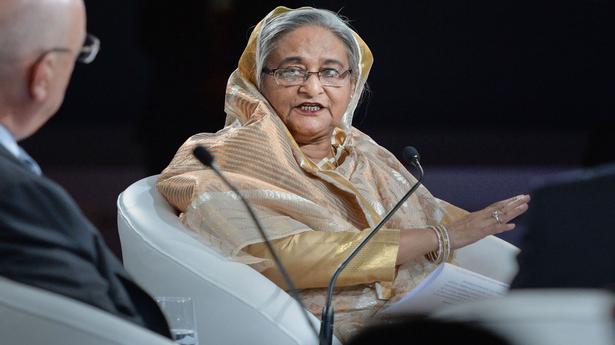
Sheikh Hasina to begin global outreach with India visit in September
The Hindu
Bangladesh PM faces criticism from Western powers for democracy deficit ahead of next year’s elections
Facing criticism from the Western powers for democracy deficit, Bangladesh Prime Minister Sheikh Hasina is likely to launch a series of diplomatic interactions, beginning with a visit to India in September. The visit was earlier scheduled to take place in July but is now being planned for September 6 to 7, sources here indicated. The India visit will be part of the greater international engagement that will include Ms. Hasina’s trip to the United Nations, and possibly other capital cities, as domestic and international "pulls and pressures" increase on the Awami League government ahead of next year’s elections.
Prime Minister Narendra Modi and President Ram Nath Kovind had visited Bangladesh to mark the half century of India-Bangladesh ties and the centenary of Sheikh Mujib but the reciprocal visit from Ms. Hasina was shifted, understandably because of emotional irritants like the recent comments by two BJP leaders on the Prophet of Islam. Though officially Bangladesh steered clear of the controversy, the issue is being blamed for communal tensions in the country, which flared up again after a mob attacked a temple and houses belonging to the minority community in Narail district after last Friday’s prayers. The frequent targeting of minority communities has disturbed policymakers there. The Indian side may also express concern over reports of heightened Pakistani activities in Dhaka.
The coming visit will therefore provide an opportunity for the two sides to hold a political dialogue on India’s relation with the Awami League and how Sheikh Hasina can handle the growing threat of fundamentalism without sacrificing democratic principles and human rights that have emerged as pressure points between her government and the West.
Last Friday, the Head of the Delegation of the European Union to Bangladesh Charles Whiteley said at an interaction organised by the Centre for Governance Studies, Dhaka, that the textile sector, which is a major contributor to the Bangladesh economy, could suffer because of "labour rights violations". The EU has intensified consultations with stakeholders in Bangladesh in recent months and on Wednesday Mr. Whiteley met the main Opposition Bangladesh Nationalist Party's Standing Committee members, including secretary general Mirza Fakhrul Islam Alamgir. The meeting, which came weeks after the newly appointed U.S. Ambassador Peter Haas pushed for “credible and transparent” elections in 2023, hinted at a hardening of posture among Western powers towards Bangladesh, possibly influenced by both domestic and global factors.
Apart from the diplomats of the EU, the UN Resident Coordinator Gwyn Lewis also met the leaders of the opposition in a show of solidarity with the anti-Hasina forces. Despite the criticism over democracy deficit, Bangladesh remains economically attractive and the International Monetary Fund (IMF) recently declared it the 41st economy in the world, and second in South Asia after India. In her coming meetings, Ms. Hasina is likely to project Dhaka’s economic potential while maintaining the cautious diplomacy that she has been maintaining over the past several years.
In April, Bangladesh abstained from a resolution that called for suspending Russia from the Human Rights Council because of its attack on Ukraine. In the first week of July, the Russia-backed Rooppur Nuclear Power Plant (RNPP) in Bangladesh got closer to a deal on liquid radioactive nuclear waste management.
Alongside traditional partners, the three times Prime Minister is also warming to new ties as illustrated by the RNPP project, where hundreds of Ukrainian scientists and engineers are working with Russia’s Rosatom. The $12.65 billion nuclear power project is likely to be operational by 2023, and alongside the self-financed Padma Multipurpose Bridge — constructed by the China Railway Major Bridge Engineering — is expected to form the “national pride” plank for Ms. Hasina’s re-election campaign.













